
Each year, on the first day of January, we celebrate a World Day of Peace.
This year, we also celebrate a Year of Mercy, which was launched in Rome on the 8th December 2015 by His Holiness, Pope Francis. This theme was chosen in the light of his profound concern for the future of the world in which all of us live.
On the 24th May 2015, he communicated this concern in a special letter which was addressed to all peoples and nations of goodwill. This letter turns our attention to the urgent need to respect and to care for our common home as one human family (the ‘Environment’). That common home is the Earth with all its God given gifts. St. Francis of Assisi spoke about it as ‘Mother Earth’. He compared it to a mother who opens her arms to embrace the needs of her whole family.
2.When God created the world, he saw that all he had made was good. Then he made man in his own image and likeness – male and female. In this way, man was made responsible to ensure that God’s gracious gifts would be shared equally among our one human family. But something happened one day in the Garden of Eden when man ate from the one fruit tree that was forbidden. From that moment, he knew that he had disobeyed his Creator and that he had broken his trust with Him. It was the first sin – greed, selfishness, disobedience, pride. And it has now spread like a forest fire down the centuries and across our world today.
Here are two examples based on reliable statistic studies:
‘The average person in the first world uses 80 times more fuel in their life time than one person from the Third World.’
‘Twenty (20%) of the world’s population consumes its natural resources at a rate that deprives the poor nations and also what future generations will need to survive. The 7th commandment tells us: ‘Thou shall not kill’!
Such examples have moved Pope Francis to declare: ‘We stand at a critical moment in the history of planet ‘Earth’. The time has come when the human family must choose its future for better or for worse. And the clock is ticking away. Who will speak for the voiceless? Who will speak for the helpless….?
3.In 1980, the then Pope John Paul II made his first visit to Africa in Ouagadougou. As the airplane was landing, he could see the parched earth where almost all vegetation was withered and animals were dead. The air itself was covered in dust and sand. He was so horrified by the time he had actually landed, that he had already made up his mind to take some form of immediate action. And so it was, that he shouted so strongly from the house tops in Europe, that the then Pope John Paul II Foundation for the SAHEL countries was able to begin providing tangible support by the year 1984. Nine countries were identified as belonging to the SAHEL. The Gambia is one of those. The criteria for support were: water supplies, women’s skills and training candidates for development work. Most of the funds were provided by two Bishops’ Conferences in Europe.
4.This great initiative has been a significant relief for the countries concerned. However, the battle of trying to turn back the irreversible movement southwards of the Sahara desert has become beyond our human capacity.
In the meantime, efforts are being made to identify some of the causes which we have witnessed in recent years: climate change, global warming, severe drought, floods, etc. At the recent summit conference in Paris, 198 world leaders took part. For the first time, a large number of leaders from the developing world made it possible to achieve more positive results than in former meetings – by putting pressure on the countries that have been mainly responsible for the inequality of mother earth’s resources. We are all travelling in the one boat. If that boat begins to go down, all passengers will eventually sink – even those on the first class deck.
5.What can WE do in our own small way in our own country? To begin with, we need to stress the conviction that we all belong to the one human family of The Gambia. There should be no frontiers or barriers behind which any of us should want to hide. Pope Francis calls it the globalisation of indifference. In God’s loving plan, every creature has its own value and significance.
Change is not possible without motivation and a process of education. The process of introducing our concern for the future of our country among our young people will take time and patience. There is a danger in trying to achieve our goals and it is this. Many are tempted to say: this is too much. We feel helpless. It just takes one or two leaders with motivation and commitment to set the process going in our schools. Let us keep in mind the all important question: ‘what kind of world do we (adults) want to leave to those who will come after us – our children who are now growing up?’ For how long more can we presume that our sources of water will be adequate? That our forests will continue to exist? That we try to improve the efforts of Set Setal to make our environment more healthy and hygienic…and many other needs.
6.The words of the Gambian National Anthem could be a powerful incentive to help us take the first steps in solidarity for a better future:
For The Gambia our homeland, We strive and work and pray,
That all may live in unity, Freedom and peace each day.
Let justice guide our actions, Towards the common good,
And join our diverse peoples, To prove man’s brotherhood.
We pledge our firm allegiance, Our promise we renew.
Keep us great God of nations, To The Gambia ever true.


